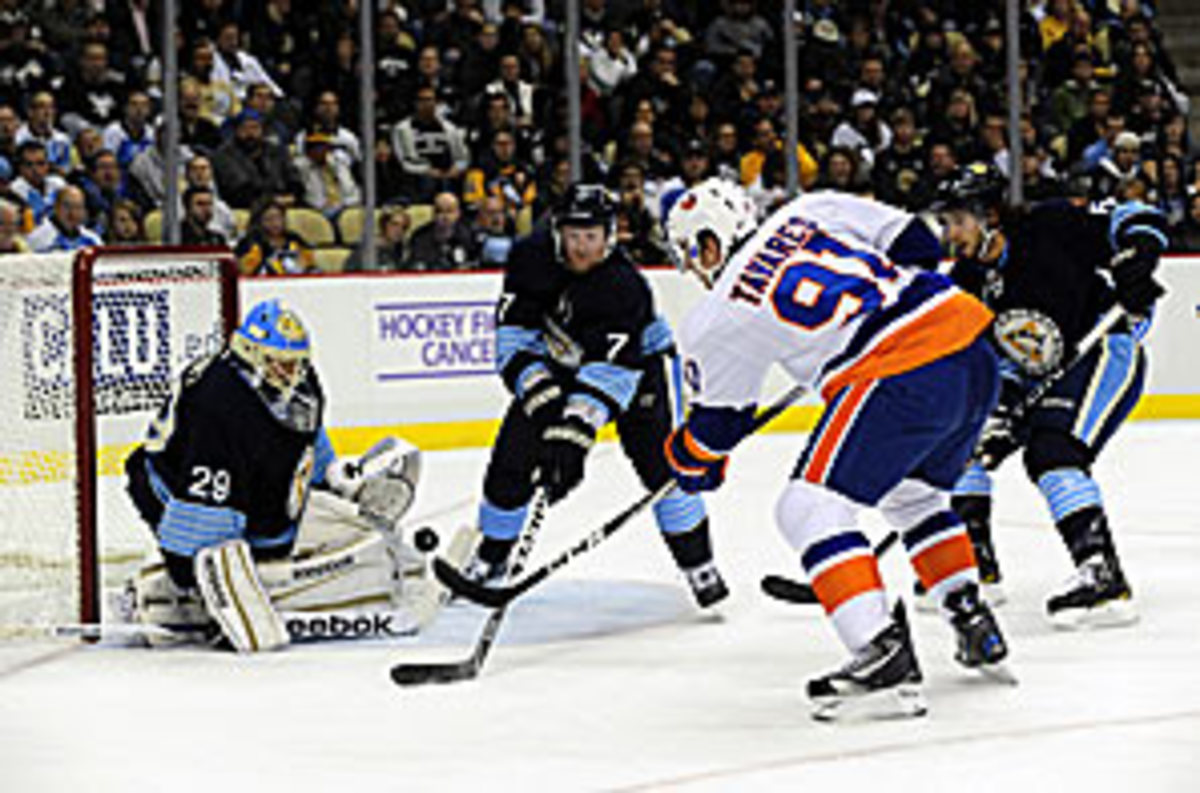The NHL's most efficent scorers
As with online columns, the reigning wisdom about shift lengths in the NHL these days is: the shorter, the better. It's nearly impossible to find a coach who doesn't preach from the book of short shifts, where lingering on the ice is seen as a sinful habit. But just how much do shift lengths matter?
In this week's edition of SI magazine, Michael Farber looked at one statistical anomaly: Devils winger Ilya Kovalchuk. The high-priced forward led the league in average seconds per shift (60.98) and while that number may be slightly skewed because he double-shifts nearly every Devils power play, routinely logging 2:30-plus while playing the point, my calculation of his even-strength ice time still came out to approximately 57 seconds.
"He has a little bit of a bigger engine," New Jersey's head coach, Peter DeBoer, says. "You've got to give him a little more leeway to stay an extra few seconds if he senses an opportunity to score or goal. I think with your offensive guys you have to give him that."
That said, how has Kovalchuk used his extra seconds? Well, statistically speaking, with just two goals and nine points in 280:31 of ice time, one could argue that he's not used them particularly well. In terms of scoring efficiency, he ranks 189th in the NHL, producing a point every 31:10 he spends on the ice. Among forwards with at least 100 minutes logged, Kovalchuk ranks 141st.
Calculating the numbers, I became curious to see who the most efficient scorers in the league are. The results aren't too surprising. In terms of points, Capitals center Nicklas Backstrom led all forwards with 100+ minutes of ice time through the games of Sunday, Nov. 6, scoring a point every 12 minutes. Toronto's Phil Kessel is not far behind, at one point every 12:52 he's on the ice. Buffalo's Thomas Vanek, Boston's Tyler Seguin, Tampa Bay's Teddy Purcell and Phildelphia's Claude Giroux each have been picking up a point every 14 or 15 minutes played.
The only intriguing name on that list may be Purcell, who averages less than 14 minutes of ice time per game. The winger may have "a tendency to fall asleep," as Lightning coach Guy Boucher remarked to the St. Petersburg Times, but he is certainly doing more with less. His average shift length (45.6 seconds) is also the shortest among the league's top 10 most efficient point-getters, much closer to the league mean (44.9 seconds).
The NHL's leading scorer, Kessel, also ranked second in goals per minute, finding the net every 27 minutes, behind the Islanders' John Tavares, who led the league with a goal every 24:52. Behind them comes Maple Leaf Clarke MacArthur, who was averaging a goal every 27:18, which is surprising considering that the winger went goalless in the first five games of the season. Toronto had three of the Top 10 most efficient goal scorers, with Kessel, MacArthur and Joffrey Lupul, who came in ninth with on every 30:42.
Of the Top 20 most efficient goal scorers, only Joe Pavelski of the Sharks and Giroux average more than 20 minutes of ice time peer game. That should make some logical sense, given that we're talking about efficiency and not sheer output, but it should also raise some questions about how much time on the ice is too much time. Is there a point where ice time actually becomes detrimental to a player or to his team?
The average shift length among our top 50 most efficient forwards by goals is 47 seconds, and the average shift among our top 50 most efficient forwards by points is 48.3 seconds. Though these numbers are a few ticks above the league mean of 44 seconds for forwards, they're a farther cry from Kovalchuk's 61-second shifts.
The longer a player is out there doesn't always correlate with his production. Jason Spezza of the Senators, for one, produced 15 points while averaging 44.6-second shifts; the Sedin twins average under 45 seconds apiece and had produced an identical (of course) 18 points each through 15 games. Players will concede that it is often tempting to stay out a few seconds longer if they have their opponents pinned in their end for a full shift or two, but they are also acutely aware of the importance of keeping it short and sweet.
"I find especially early in the game, if you get caught out for a long time, it's tougher for you to recover," Devils winger Zach Parise says. "It can take 3, 4, or 5 minutes to recover from that one shift."

































